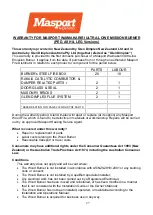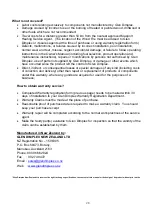
14
5.0 Operational Sequence (For various steps refer images shown in the bracket)
5.1 Before First Light-up
-
Make sure that all the packing material has been removed from the combustion chambers.
-
Make sure the catalytic combustor and stainless steel flame arrestor plate are installed correctly.
Please note that the special high-temperature paint is used in the firebox that will emit some smoke as it cures
during the initial two to three sessions of running. Ventilate the house during these initial burns. While curing the
surface, heated paint softens, so do not touch hot surfaces during this process. Babies, small children, pregnant
women, elderly persons, persons subject to pulmonary hypersensitivity, and pets should avoid exposure to this
smoke. Open doors and windows and use a fan, if necessary. After these initial burns, there should be no smoke.
5.2 Cold Startup
5.2.1 Initial light-up with kindling and intermediate load
1. Gently lift the damper handle and set it to the
“OPEN”
position and the air slide to the
“HIGH”
position.
2. Stack the intermediate load made of 4 small size logs, at the base of the firebox.
3. Stack around 15-16 very small kindling pieces on top of these logs. This initial light up procedure is the
“
Top-Down Start-Up”
method, which reduces the particle emission during the start-up phase
considerably.
4. Place the firelighters on top of kindling and light the fire. We recommend green firelighters made of wood
waste.
(1)
(2)
(3)
(4)
5.2.2 Intermediate load 2
5. Keep the door ajar slightly.
6. Close the door approximately
after 10 mins
making sure that the kindling is well alight. Do not change
the damper or air slide position at this stage. At this stage, the combustion gases are passing over the
combustor and pre-heating it.
7.
After 15~17 mins
, once the small logs are more than 50% burnt, open the door to add 2
nd
intermediate
load, i.e., 4 pieces of medium firelogs. Close the door and continue to lite the fire on the “HIGH” air slide
setting.
8.
After 20~22 mins
, gently turn the damper handle to the
“CLOSE”
position. By now, the combustor will
be preheated to the required temperature. Closing the damper will divert all combustion gases through
the combustor only. The combustor will start glowing in a few mins.
(5)
(6) – 10 mins
(7) – 15~17 mins
(8) – 20~22 mins
DO NOT LEAVE BURNER UNATTENDED DURING THIS INITIAL LIGHT-UP PERIOD
ALWAYS SWITCH DAMPER TO “OPEN” POSITION BEFORE OPENING THE DOOR







































